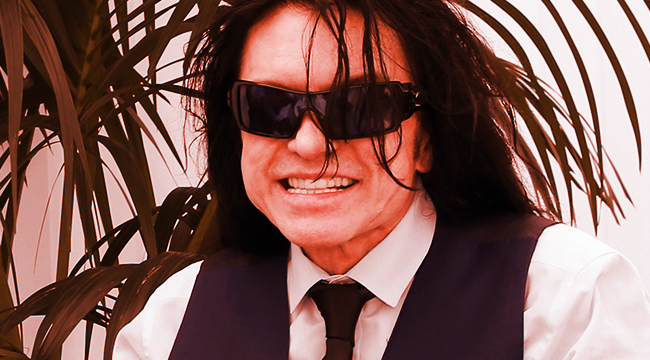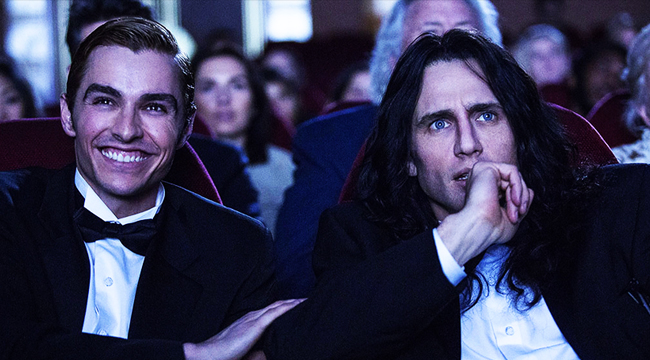
Ahead of The Disaster Artist‘s Blu-ray release on March 13th, I was offered a chance to speak with The Room‘s mysterious creator, Tommy Wiseau. Naturally, I took it.
I have a theory about the public’s ongoing obsession with Wiseau’s 2003 film, whose production and subsequent fandom spawned first Greg Sestero and Tom Bissell’s bestselling book The Disaster Artist, and its subsequent film adaptation. My theory is that, beyond the unintentional hilarity and comic ineptitude, The Room feels like such a revealing window into its creator’s psyche, an extended Freudian slip, that we feel inspired to delve and to discuss and to obsess. Meanwhile, The Room‘s actual creator, Tommy Wiseau, is a man so comically mysterious, so impenetrably strange, that you never get what you came for. The film whets an appetite you can never satisfy.
That one of the world’s most secretive people — early on in their relationship, Wiseau told Sestero “Don’t talk about me” — accidentally created one of its most revealing roman à clefs is a kind of poetic justice. The Room‘s Johnny is pure pathos (“Everybody betray me”). Meanwhile, Wiseau can’t be pinned down on the most basic of basics, like his real name, age, or country of origin. (You can find the most plausible rumors with an easy Google, but I respect Wiseau’s weirdness too much to repeat them here.)

On some level, we know that we can never know about Wiseau, and yet we can’t resist, trying to learn something, anything, more about this Red Bull-chugging self-described vampire — not the least of which the source of the estimated $6 million he spent making The Room. It’s a little more than an idle fascination for yours truly. I once recorded a 90-minute podcast with someone who worked for Tommy Wiseau for 11 years, and have spent just as long talking to Sestero.
Over the course of those talks, I picked up some intriguing nuggets. Like that Tommy has a brother who didn’t seem to speak English. That there was a former business partner named “Eli.” That he used to go by “Thomas” and would get mad if anyone called him something else. That, uncharacteristically, the famously capricious Wiseau was actually a pretty good boss, sending his best employees to Hawaii and occasionally making small talk about resorts and parasailing (the mind reels at the thought of Tommy Wiseau, he of the long dark hair, the multiple belts, the constantly full cargo pockets, parasailing).
It’s notable, of course, that none of these nuggets came from Wiseau himself. Still, I couldn’t resist the opportunity. You know he isn’t going to tell you anything you really want to know, but there’s always the chance that he might accidentally reveal something. Like the key to his whole, you know… deal.
Wiseau isn’t the only obstacle to learning more about Wiseau. This was to be a three-way phone interview, with Wiseau and Sestero, and perhaps the only thing harder than trying to understand Wiseau in person, with his mumble-prone delivery and unique grasp of English, is trying to understand him talking into a speakerphone. They ended up giving us 10 minutes, which is normally too short to even bother, especially with three people on the line, but hey, it’s Tommy Wiseau! All I really expected was a surreal experience, and to maybe make a transcriber quit in frustration.
The first was easily achieved, and the interview was about as much of a debacle as I expected, including my own screw-up, managing not to record the first four minutes of the talk. I had asked Wiseau about whether he had been a gymnast, and about his current workout regimen. As expected, he sidestepped the question of gymnastics completely. Of his current exercise routine he told me only that he spends 20 minutes a day thinking positively. “Everyone should try it,” he said.
I asked Wiseau how he financed The Room, the obvious question. “I answer your question with my question,” he said after a pause. “Do you work?”
“Yes,” I said, an easy one to answer when you’re currently on the job.
“Do you save?” he asked.
“Uh… I try to,” I answered, suddenly on the defensive.
“Well, there you are. Me, same answer,” he said, satisfied, as if there was definitive proof contained in the exchange.
The following is the brief phone interview we had once I turned my recorder on.

How long did it take you to write The Room?
Tommy Wiseau: Five years from the beginning, if I, if I count all the stuff they’ll have a tendency to write on the piece of paper. The time when I met Greg and the way before. And I said, “Let me put everything together.” So, I put it, actually it’s 600 pages that are condensed to 112 pages. And Greg actually helped me with production, because when you can buy the original script of The Room, it’s writing from the script. So, all this bootlegging script that people selling online is completely ridiculous. But, I’m very happy that… it was not easy task, honestly. I just like, I have like full version of The Room, so.

I also wanted to know, in The Room, how did you prepare for your, for your big sex scenes? Greg also can answer that as well.
Greg Sestero: [Laughs.]
Wiseau: Okay, Greg first but uh, we called it love scene, but you can say whatever you want, ha ha. Greg, you can go first.
Sestero: How did I, how did I prepare for my sex scene? Um…
Wiseau: Love scene. [Laughing.]
Sestero: I, uh, my love scene. I just made sure, uh, that my pants stayed on, that was the biggest thing. Because I just, I just don’t think I could have competed, uh, with Tommy’s uh–
Wiseau: Oh please.
Sestero: –Tommy’s scene, so uh, I just tried to uh, to get them over as fast as possible and uh, and try to look like I was semi-enjoying it. And I think I did not pull that off.
Wiseau: Well you, you did a good job Greg, ha ha ha.
And you Tommy?
Wiseau: In my case, you know, I prefer very difficult scene because, first of all, we was very respectful towards Juliette [Danielle] and everybody and the actors. Even though, you know, you look at Disaster Artist and it’s one scene, when James [Franco] play me confirm the crew and actors to say, “Oh record this, I know who you are etcetera whether you talk about it.”
And that’s what happens on the set, speaking on a realism, and what is real, what is not, and that’s happened on the set of The Room. Because, I warned everyone and people didn’t realize that the real camera, and we’re shooting everything behind the scene. But people was very disrespectful, that’s the story. Story end.
Now, to respond to your question, love scene, uh, I don’t mind people say the sex scene, it’s doesn’t matter for me, but I call love scene. So basically, it was a lot of preparation because we have a lot of rehearsal. I don’t know, remember Greg? You remember before we shot it though, so–
Sestero: There was a lot, a lot of rehearsing.
Wiseau: Right, so the rehearsal was better than the actual, the time where it was shot, because of the — you know, it’s a lot of preparation with the crew. And keep in mind, it was the closed set, so some people say it was not closed set, included one of scene of the change of The Disaster Artist. That is incorrect statement. We have a closed set, we have minimal people on the set to do the, the love scene. And so with the last preparation I said, because when you see the camera, camera, the studio was very small, so we couldn’t, we couldn’t doing the camera. I wanted the camera go on the top, and I have like 360, I don’t know if you can visualize, I, I, I assuming you’re a television guy.
Mm-hmm.
Wiseau: Um, so, so we want a camera on the top of the bed. And the, the, the stage was extremely, was not tall enough, so we actually did a ladder, we did a lot of different angles, so you can see it. If you see the, the love scene, uh, two scene, which people say, “Oh it’s the same scene.” Well I have a news for you guys, it’s not the same scene, okay. So bottom line is a lot of preparation, it was not easy task, to be honest here, for everyone actually, crew as well as actors.
Wow, that’s good, all right, uh, um…
Publicist: Hey, this is [redacted] jumping in, I’m so sorry to interrupt. You have time for about one more question.
Okay, um, you guys are both big movie guys. I wanted to know if you, if either of you guys, if you have a first movie memory? Like, the first movie that you remember watching or that you got really into.
Sestero: I think mine was Back To The Future, I saw it at the cinema with my dad in, like, 1985 or something, I was like seven or eight, and I remember just thinking, uh, how much I wanted to like live in that film. And, but it was actually Home Alone that ended up making me want to work in movies, which is a strange first movie to propel you into that. But yeah, it was Back To The Future and Home Alone.
Wiseau: Uh, for me it was Citizen Kane Orson Welles, because this movie really, I mean I’m just like, it had everything in it, even, even though it’s black and white but you can learn from it as well. As well as, if you can compare it to the same thing to Orson Welles, I didn’t realize, so I realize now that I find out that Orson Welles he has similar style with the releasing of these old movies. Because, his movies people want to burn actually, I don’t know if you know the history of the Citizen Kane.
Mm-hmm.
Wiseau: Uh, due to the fact, due to the fact, that he put in the movie something stuff, people didn’t like it, business people didn’t like it, whatever. Now The Room was similar that we have difficulty to release it but we have great support with everybody. As you know, past two years, although let me take this opportunity, I’m gonna say thank you to all the fans of The Room, as well as the media, as well as the bloggers, who were very sincere about The Room, and, and… very nice, so I would say thank you very much, so.
Uh, well I will s-
Wiseau: That’s important for them.
I will say you’re welcome, on behalf of myself and all of them.
Wiseau: Thank you. [Laughing.] You have any more questions? One more? Or we done?
Sure. Uh, do you have a favorite football team?
Sestero: Who me? Yeah, 49ers.
Wiseau: 49ers.
You’re both the same. All right. How about a favorite book?
Sestero:In Cold Blood, Truman Capote.
Wiseau: And actually I like Streetcar Named Desire, uh, as you know.
Sestero: Not The Disaster Artist, Tommy?
Wiseau: Uh, Disaster Artist obviously … I don’t wanna, I don’t wanna push it too much because, that it’s your project. And, I support Greg, I mean, it’s obvious, going on 18 year, yeah I support Greg. The same he support me. But Greg, Greg is only one person who actually support my idea of The Room. I didn’t realize ’til our review all the state when people badmouth, or… sometimes I educate people on the scene of The Room. I don’t know if you know that we have regular screening, and we have like the Q and A, we call it? And then this is my new thing of 2018 “Respect equals success,” so think about it.
